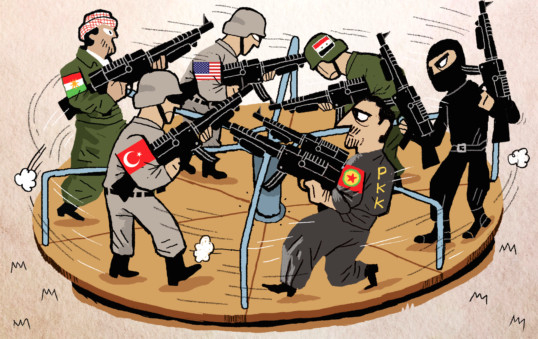
In a startling shift of policy, Turkey has abandoned years of refusing to intervene in the Syrian civil war. Following the suicide bombing by Daesh (the self-proclaimed Islamic State of Iraq and the Levant) of a Kurdish camp in Turkey, President Recep Tayyip Erdogan’s government has joined the international coalition against the terrorist group, but in an equally important shift, Erdogan has also ended his truce with the separatist Kurdistan Workers Party (PKK).
This puts Turkey in the curious position of fighting with the US and its international allies against Daesh, but also fighting the PKK, which is recognised by the international forces as an important ally in the fight against Daesh and one of the few forces that has beaten Daesh on the ground in northern Syria. Turkey has ended up supporting two opposing sides.
Erdogan’s suspicion of Kurds is deeply ingrained in his nationalist agenda. He is very worried about Kurdish successes in northern Syria, where they now control new territory on Turkey’s border around Kobani in the centre and Afrin in the far west, which are in addition to the well-established Kurdish territory around Qamishli in Syria’s far east bordering Iraq.
For a while, it seemed that Erdogan was willing to support the line of Kurdish territory on its border as a welcome buffer against the violence of the Syrian civil war and the Islamists in particular. But this strategy has collapsed due to his fear of the PKK restarting its bombing and violence in Turkey from this new territory.
Some of this may have to do with Erdogan’s unsatisfactory situation after the recent parliamentary elections. His Justice and Development party (AKP) and its Islamist agenda won a fourth straight general election but just failed to get a majority in parliament, which stopped Erdogan having a chance at rewriting the constitution to give himself the executive presidency that he craves. This was in large part thanks to a breakthrough by a pro-Kurdish coalition, the Peoples’ Democratic party (HDP), which got more than the 10 per cent threshold for entry into parliament with support from its Kurdish base and new Turkish voters who disliked Erdogan’s increasing authoritarianism.
Certainly, the HDP sees Erdogan’s new war against the PKK as a device to rally nationalist support in a snap autumn election with the hope of winning the parliamentary majority he desperately wants. This ploy may not work, as other Turkish commentators have warned that Turks are shocked and willing to challenge the logic of finding their country suddenly fighting two new enemies in Daesh and the PKK, after years of avoiding the Syrian fighting.
Barzani
But despite turning on the PKK, Erdogan has been very careful to avoid spoiling his good relations with the Kurdistan Regional Government in the north of what used to be Iraq. Turkey has been a close ally of President Masoud Barzani increasing Kurdistan’s autonomy to virtual independence and this alliance has remained in place so far. Both sides have far too much to lose to wreck a profitable relationship. Barzani is well aware of this and has urged both Turks and the PKK to return to peaceful discussion and for the PKK to preserve the Kurds’ recent political gains in Turkey, referring to the HDP breakthrough.
“What you can achieve through peace won’t be achieved through fighting,” said Barzani. “For me, the Kurdish case is above everything,” even if he was explicit about disowning the PKK. “Concerning Turkey and the Kurdistan Workers Party, we do not represent Turkey’s politics and we are not responsible for the PKK’s politics. What we can offer is to help get them together to settle their issues through dialogue and mutual understanding.”
America
US forces have been helping the Peshmerga of Kurdistan fight Daesh and US Defence Secretary Ashton Carter was in Irbil this week, talking to Kurdish leaders about their success against Daesh.
He told Barzani that the peshmerga, were “the model of what we are trying to achieve” with a strategy of enabling capable and motivated local forces in northern and western Iraq to succeed in the ground combat, even if the Obama administration still insists on channelling its arms, training and advice to the Kurds through Baghdad as it tries to preserve a fading hope that the country will not split into sectarian and ethnic enclaves.
The Americans have been willing to give the same aid to the PKK forces in Syria, as Washington has prioritised fighting Daesh over everything else. In the very confused Syrian war, the Americans had tried to support the ineffective Free Syrian Army, but to very little effect, and when their allies worked with the Islamist group Jabhat Al Nusra to take the Idlib province from the government, the Americans did not protest as they needed to find winners to back.
The problem the Americans now have to resolve is that their anti-Daesh priority is not shared by Erdogan, their Nato ally, who sees the PKK as a much great threat than Daesh. This makes any American support for the PKK in the war against Daesh very problematic for the Turks.












